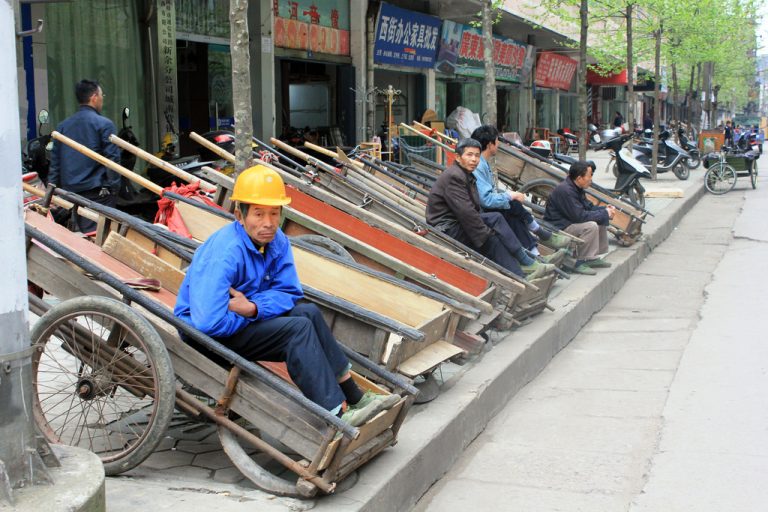The U.S. unemployment rate has recently reached a low of 3.9 percent, with over 200,000 new jobs added in August alone. But across the Pacific, China is struggling with a massive, yet hidden crisis.
Due to the Sino-U.S. trade war, many foreign investors have been pulling capital out of China, while Beijing itself pursues tax policies that are squeezing local companies of profits and effectively forcing them to lay off workers.
And while China’s National Bureau of Statistics claims that the nationwide urban unemployment rate was just 5.1 percent in July, many dispute the Chinese regime’s figures.
According to Chinese expatriate economist He Qinglian: “Scholars analyzing the Chinese economy never trust this kind of data,” which she termed “statistics with Chinese characteristics” in an article translated and published by The Epoch Times.
Citing a Chinese journalists’ association, He Qinglian noted that the real Chinese unemployment rate could be well over 20 percent.
Success
You are now signed up for our newsletter
Success
Check your email to complete sign up
In 2017, she wrote, the Meteor Federation of Journalists, also called the Youth Media Association, published an investigative article titled “China’s Unemployment Rate — the Hidden Truth.”
Of China’s 1.38 billion people, there were over 900 million people between the ages of 15 and 59, of which roughly 840 million were not in education or training, the article said. But while official statistics from 2016 put the total number of employed Chinese at 775 million, that figure also includes 130 million peasants aged 60 or older.
Peasants, the article said, are considered by the Chinese government to be employed for life — that is, well beyond normal working age. This meant that the actual number of employed, working-age Chinese was at most 646.75 million in 2016. On the other side of the equation, almost 200 million working-age Chinese were unemployed that year — an actual unemployment rate of over 22 percent.

Peasants, the article said, are considered by the Chinese government to be employed for life — that is, well beyond normal working age. (Image: William via Flickr CC BY-ND 2.0)
According to He Qinglian, China’s prospects become even bleaker once the oncoming Sino-U.S. trade war takes effect, causing foreign and Chinese companies alike to shift production out of the country.
Starting this summer, the Trump administration has imposed tariffs on over $200 billion worth of Chinese export goods in response to the latter’s illegal and predatory trade practices. The Chinese have responded with counter-tariffs to target the goods — many of them essential commodities, such as soybeans and other foodstuffs — that it imports from the United States.
Citing a number of recent news reports, He Qinglian described a general trend of manufacturing once based in China being shifted to other regions such as India and Southeast Asia. Even China’s own companies have found it cheaper to outsource production abroad.
He Qinglian believes the exodus of capital will have a massive impact on the Chinese economy. “A widely quoted figure is that according to official estimates, the total number of people directly employed with all foreign-invested enterprises is more than 45 million,” she wrote.
“In addition, there are countless suppliers and upstream and downstream enterprises that rely on foreign capital to survive, involving hundreds of millions of people.”
He Qinglian also observed that China’s recent tax reform, announced at the end of August, tightens up on companies that are not pulling their weight when it comes to shouldering China’s heavy social security payments. It will make companies pay an additional 20,000 yuan ($3,200) a year, forcing many businesses to lay off staff when the reform becomes active starting in 2019.
Per the tax reform, China’s corporate tax will increase from 31 percent to 44 percent, which will make it the country with the world’s second-highest corporate tax rate.
According to He Qinglian, the Chinese Communist Party (CCP) has been using its immense economic growth as a geopolitical tool to “change the international rules,” rather than genuinely integrating itself with the principles adhered to by developed countries.
“Beijing has long acted as if opening up the Chinese market to Western countries is a special privilege it has afforded the West, while failing to recognize the thanks that China’s economic prosperity owes to the international trade system,” she wrote.
The trade war, however, has caught the CCP off guard. “If the CCP were to rewrite and dominate the standards of international conduct, it would have to challenge the United States,” He Qinglian wrote. “But when the trade war came, it was unexpected, and China did not have enough assets for competition.”
Follow us on Twitter or subscribe to our weekly email














